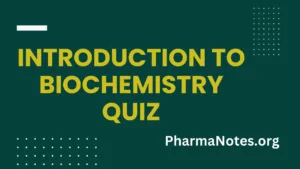Introduction to Biochemistry Quiz

Welcome to our online realm of biochemical brilliance! Dive into the fascinating world of molecules, enzymes, and cellular wonders with our “Introduction to Biochemistry Quiz.” This quiz is your gateway to unraveling the mysteries of life at the molecular level, making biochemistry accessible, engaging, and downright fun!
Introduction to Biochemistry Quiz
Who Can Benefit:
- Students: Reinforce classroom learning and test your biochemistry knowledge in a dynamic online environment.
- Educators: Use the quiz as a supplemental resource to engage students and reinforce key concepts.
- Lifelong Learners: Explore the wonders of biochemistry in a user-friendly format, perfect for those curious minds outside the classroom.
frequently asked questions (FAQ) list about the introduction to biochemistry:
Q1: What is biochemistry? A1: Biochemistry is the branch of science that explores the chemical processes within and related to living organisms. It involves the study of molecules and chemical reactions that occur in biological systems.
Q2: Why is biochemistry important? A2: Biochemistry is crucial for understanding the molecular mechanisms of life. It provides insights into the structure and function of biological molecules, helping to unravel the complexities of cellular processes and contributing to advancements in medicine, agriculture, and biotechnology.
Q3: What are the main biomolecules studied in biochemistry? A3: The primary biomolecules studied in biochemistry are proteins, nucleic acids (DNA and RNA), lipids, and carbohydrates. These molecules play essential roles in the structure and function of living organisms.
Q4: How are proteins important in biochemistry? A4: Proteins are vital macromolecules that serve various functions in cells, including enzymatic catalysis, structural support, transport, and signaling. They are essential for the structure and function of cells and are involved in virtually every biological process.
Q5: What is the central dogma of biochemistry? A5: The central dogma of biochemistry describes the flow of genetic information within a biological system. It states that DNA encodes RNA, which, in turn, encodes proteins. This process is crucial for the synthesis of functional proteins in cells.
Q6: How does biochemistry relate to metabolism? A6: Biochemistry is closely linked to metabolism, the set of chemical reactions that occur within living organisms to maintain life. Biochemical processes, such as glycolysis and cellular respiration, are central to understanding how cells generate and utilize energy.
Q7: What is the role of enzymes in biochemistry? A7: Enzymes are biological catalysts that facilitate and accelerate biochemical reactions in living organisms. They play a crucial role in regulating metabolic pathways and maintaining cellular homeostasis.
Q8: How does biochemistry contribute to medicine? A8: Biochemistry provides the foundation for understanding the molecular basis of diseases. It is essential for drug development, diagnostic techniques, and the study of biochemical pathways implicated in various medical conditions.
Q9: What are the key techniques used in biochemistry research? A9: Biochemists employ a range of techniques, including chromatography, electrophoresis, mass spectrometry, and various spectroscopic methods, to analyze and characterize biological molecules.
Q10: How has biochemistry evolved over time? A10: Biochemistry has evolved significantly, from its roots in organic chemistry and physiology to a multidisciplinary field integrating molecular biology, genetics, and biophysics. Advances in technology have revolutionized the study of biomolecules and their functions.
Also, Visit:
B. Pharma Notes | B. Pharma Notes | Study material Bachelor of Pharmacy pdf